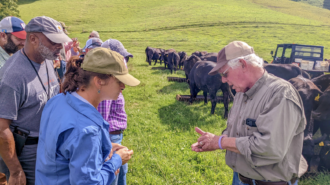Grazing networks promote a mutual self-help approach to learning that is based on shared local experience and that provides several benefits to participants. This publication offers suggestions for finding or starting a grazing network and provides examples of the kinds of activities grazing networks might conduct. It also contains recommendations for sustaining a grazing network over time. Local farmers with specialized knowledge work in symbiotic relationships to grow their farms and communities. Grazing networks outlined in this publication allow for both learning and teaching from each member of the group, creating productive and supportive systems. Though they may be challenging to create, grazing networks are worth the educational, economic and social benefits for years to come.
Want more information? See the related SARE grant:
This material is based upon work that is supported by the National Institute of Food and Agriculture, U.S. Department of Agriculture through the Sustainable Agriculture Research and Education (SARE) program. Any opinions, findings, conclusions, or recommendations expressed in this publication are those of the author(s) and should not be construed to represent any official USDA or U.S. Government determination or policy.
